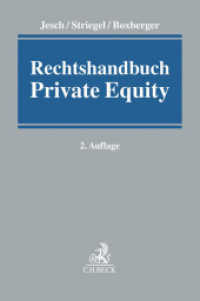Full Description
This book discusses terrorism and the rise of Hindu nationalism in contemporary India and examines how this movement has become a threat to democracy in the country.
The work analyses the rise of Hindu nationalism, culminating in the success of Narendra Modi's Bharatiya Janata Party (BJP), the political arm of the movement, in the 2019 Indian national elections. It offers an accessible account of the complexities and subtleties of Hindu nationalism and the dangers it poses to India's pluralistic democracy and secularism. A major theme of the book is the role that terrorism has played in the rise of Hindu nationalism, a factor often underplayed or ignored in other studies, and it also challenges the widespread belief that terrorism is largely an Islamic phenomenon. Employing a cross-disciplinary approach, the book is highly relevant to both academics and policymakers, given India's importance as a major global economic and military power.
This book will be of interest to students of terrorism and political violence, South Asian history, Indian politics and international relations, as well as policymakers.
Contents
Introduction 1. Hinduism, Caste and Politics: An Overview 2. Islam and Christianity in the Indian Sub-Continent: Myths and Misconceptions 3. Hindu Nationalism: An Historical Overview 4. The Militias and Foot Soldiers of Hindutva Terror 5. Politics, Religion and Terror: The Demolition of the Babri Masjid 6. State Terrorism, Politics and Communal Violence in the Indian State of Gujarat, 2002 7. Terrorism in "Paradise": Hindu Nationalism, Terrorism and Politics in the Kashmir Valley 8. Contemporary Developments: The Saffron Threat to Indian Liberal Democracy Conclusion








